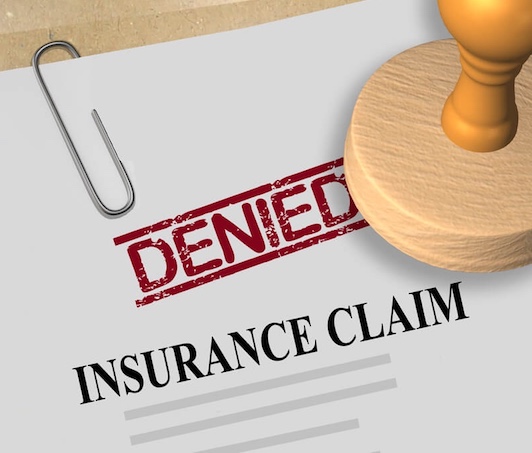
Unfair claims settlement practice is the improper avoidance, or reduction of a claim by an insurance company. There are many methods or tactics that insurance companies might use to unfairly handle the settlement of claims, and it unfortunately happens quite often. There are also laws in place to protect consumers from unfair treatment during the process of insurance claim settlements.

We’ve provided details below to help better understand unfair claims settlement practices, what to look for, what to avoid, and what you can do if you believe your insurance company is treating you unfairly.
When you buy an insurance policy, you’re signing an agreement with your insurance company. That agreement states that your insurance company is legally required to cover certain damages when they take place under certain circumstances.
When an insurance company engages in unfair claims settlement practices, it’s attempting to reduce its costs by denying or limiting your claim.
Under an insurance contract, both parties, the insured policyholder (you) and the insurer (insurance company), have an obligation to act in good faith and behave reasonably. Unfortunately, insurance company bad faith tactics are more common than many people realize.
Obviously, unfair claims settlement practice is illegal in all state jurisdictions, and consumers may have to fight for their rights in order to be covered or to obtain a fair settlement from their insurance company.
How do you determine when unfair claims practice takes place? the National Association of Insurance Commissioners (NAIC) has created model unfair claims practice legislation that requires claims to be handled fairly.
One of the key requirements of this legislation is for clear communication between the insurer and the insured. Because of this legislation, many states have implemented unfair claims settlement practice laws, making it easier for consumers to receive coverage from their insurance company – even if that insurance company is acting in a deceptive or malicious way.
States have different laws regarding unfair claims settlement practices, and different states have different rules for how it’s defined.
In most states, however, unfair claims practice is defined under something called the Unfair Claims Settlement Practices Act (UCSPA), which protects insurance buyers from bad behavior by insurance companies.
It’s important to note that the UCSPA is not federal law, and the specifics of the law vary widely between states. The stories you hear about unfair claims practice in one state might not hold true in another state.
Insurance companies across the United States engage in unfair claims settlement practices every day.

Some violations are severe: like when an insurance company denies a total loss claim entirely. In most cases, however, unfair claims practices consist of minor offenses or denials of coverage. The insurance company is often hoping you don’t notice these offenses, thereby saving them money.
In other cases, insurance companies engage in unfair claims practices simply by delaying, and continuing to delay a claim.
Examples of unfair claims settlement practices include:
The Insurance Company Delays Payment on Small Business Insurance
Let’s say a business owner buys a commercial property insurance policy. This policy protects his company’s building and business personal property. There is a fire in the building, causing $200,000 in property damage. The insurance company delays the claim and avoids covering the $200,000 promptly. The business owner is unable to repair the damage. The insurance company continues to delay. They might use methods of delaying such as claiming they forgot to send claims forms and not responding to calls. Or, the insurance company might insist they never received proof of loss, when you’ve already sent multiple proofs. These are all situations unfair claims settlement practice laws are meant to prevent.
The Insurer Misrepresents The Policy
In other cases, an insurance company might misrepresent a policy. They might claim certain things are not covered – when in reality, they’re covered explicitly in your policy. Unless you’re an insurance expert, you may not understand the terms of your policy, and you’re left uncovered for things that should genuinely be covered under your insurance policy.
The Insurance Company Made a Significant Alteration To An Application Or Policy
In some situations, insurance companies take part in unfair claims settlement practice by making significant alterations to an application or insurance policy – without consent or notification – after it’s submitted. For example a claim is submitted to cover $50,000 in property damage. The insurance company approves the claim – but they’ve modified the amount of coverage to be just $40,000. The insurer then refuses to pay the additional $10,000.
The Insurance Company is Paying Less Than Reasonably Expected
In other cases, an insurance company may be participating in unfair claims settlement practices by paying less for a claim than what someone would reasonably expect to receive. The insurance company might have lured a customer in with an advertisement for a cheap flood damage insurance policy, for example. Then, when a claim is made on that insurance policy, the customer learns that paying an additional premium was needed to get the coverage advertised in the original ad.
Unfair claims settlement practices laws vary between states. Generally speaking, however, a state’s UCSPA will focus to have protections in place for misrepresentation or alteration, timeliness, unfair acts, unfair requirements and overall deceptive claims handling.
Misrepresentation or Alteration
An insurance company might misrepresent or alter an insurance policy in various ways, leading to allegations of unfair claims settlement practices. Some of the ways a company does this is by:
Timeliness
Some insurance companies engage in unfair claims settlement practices when they waste time, drag their feet, or take too long to respond to inquiries and claims. Examples of this include:
Unfair Requirements
Some insurance companies will place unfair requirements on customers, including:
Unfair Acts
Finally, some insurance companies engage in unfair claims settlement practices through unfair acts, including:
Many people assume their insurance company is dedicated to protecting its customers and have their best interests in mind. In reality, an insurance company is a for-profit corporation that is more likely to be dedicated to protecting its bottom line.
When an insurance company engages in unfair claims settlement practice, it’s crucial that you fight back and avoid becoming a victim of an unfair settlement.
Consider hiring a public adjuster to help. A public insurance adjuster can handle your insurance claim from beginning to end or assist with negotiations, appraisals and understanding your coverage under the insurance policy. If you feel that your insurance company is participating in unfair claims settlement practices then a public adjuster can be your first line of defense and help determine what the next best course of action should be for your particular situation.

Stephanie is a property insurance claim expert with over 20 years of experience working as an insurance adjuster, expert witness, appraiser and umpire. She is passionate about sharing her expertise, knowledge, tips and training to help both property owners and Public Adjusters in their pursuit of effectively managing claims and recovering the claim settlement they deserve after a loss.